Montgomery County Public Schools (MCPS) in Maryland is rapidly expanding its electric school bus fleet. A partnership with Highland Electric Fleets, a turnkey solution provider, enabled the district to reap the benefits of electrification without additional financial burden to the community.
MCPS plans to electrify its entire fleet in 10 years, setting an example for school districts across the country.
“I am lucky to drive this kind of bus. When you drive the neighborhood, they love it because it is not noisy,” said Moises Abrigo, who has been a school bus driver in Montgomery County since 2008.
Abrigo drives one of the 20 electric buses allocated to the Bethesda depot of MCPS.
MCPS reached an agreement with Highland in February 2021 to procure 326 electric school buses by 2025, which was touted as “the largest single procurement of electric school buses in North America.”
Eighty-six electric buses have been deployed, and 120 more will arrive in the school year 2023 and 2024. All of the six bus depots in MCPS will be equipped with the charging infrastructure by early 2023.
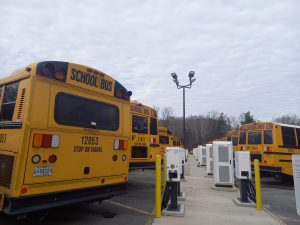
“Most of the school districts out there are buying just one or two [electric buses],” said Gregory Salois, director of department of transportation at MCPS. “The biggest thing was, it was cost neutral for the citizens of Montgomery County.”
Highland purchases the electric buses, installs the charging infrastructure at the bus depots, and pays for the energy cost and maintenance under the contract. In return, MCPS pays around $40,000 per bus per year for 12 years, which is the lifespan of an e-bus.
“Highland absorbs all costs of buses and infrastructure, and MCPS only pays the same yearly cost as we would if MCPS purchased diesel buses,” Salois explained. Without this scheme, an e-bus is still too expensive for a school district to introduce, he said.
Typically, an electric school bus costs around $370,000 to $380,000 to purchase, compared to $150,000 to $160,000 for a traditional diesel bus, Salois said. The fixed cost is too high, even though the yearly operating cost is around $10,000 lower for an electric school bus in MCPS than a diesel one due to lower fuel and maintenance costs.
The size of the school district also helped, Salois said. MCPS is the sixth largest school bus operator in the country, with around 1,400 buses. Eighty-six e-buses only represent 6% of the fleet, and “we can still rely on the other vehicles we have if we need to,” Salois said.
Electrification of buses brings benefits to the environment and the health of students and drivers.
On a typical school day, MCPS diesel buses use approximately 17,000 gallons of diesel fuel, which emit greenhouse gases and other harmful matter from tailpipes, according to MCPS. Also, toxic pollutants can be as much as 2.5 times more prevalent inside a diesel school bus than inside an electric one.
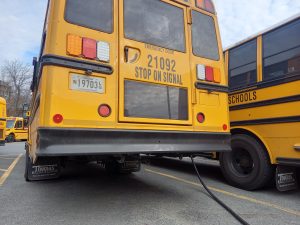
However, there are additional benefits that e-buses bring to the community, said Matt Stanberry, managing director of Highland during a Nov. 30 hearing at the U.S. Senate Committee on Environment & Public Works.
“Because the ambient noise level in an electric school bus is so much lower than in traditional school buses, it makes for a safer environment for the bus driver,” Stanberry said. “Students can hear each other and naturally their volume drops, and the bus driver has an easier time hearing what’s happening outside the bus.”
Stanberry pointed out that school districts are using new electric buses as a way to recruit new drivers in the midst of a nationwide shortage of school bus drivers.
“Once they drive the bus, they will not give the bus up,” said James Beasley, depot manager at the MCPS Bethesda depot. “Drivers can control the speed much better. The bus slows down a little bit quicker and accelerates gently.”
Beasley said it takes about three-to-four hours to fully charge a bus, and the mileage depends on the season. In summer, a fully charged bus can run about 130 miles with air-conditioning, while the mileage decreases below 100 miles in winter when heating is on.
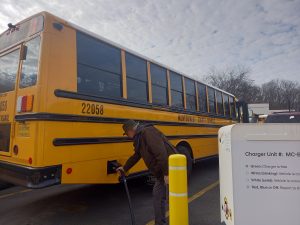
The mileage easily covers the 60-70 miles that a school bus in MCPS runs on a typical day, but Beasley said they charge the buses every day. For longer school trips, they are still using diesel buses to avoid the risk of losing power on the way, Beasley said.
Montgomery County experienced a massive power outage on Sunday, Nov. 27, but Beasley said “all the buses were fully charged. They were ready to go on Monday” even though MCPS closed all the schools for safety concerns.
An electric bus fleet in MCPS is expected to bring another benefit to the community.
“Most school bus fleets sit idle all summer and during school breaks. There is an opportunity to use those idle batteries to deliver power back to the grid,” explained Alison Mickey, managing director, head of marketing at Highland said in an email.
The “vehicle-to-grid (V2G)” services, that send stored power back to grid when demand spikes during the day, is slated to begin next summer in MCPS, Mickey said.
Aaron Viles, director of campaigns at Electrification Coalition, a transportation electrification advocacy organization, said “whether you have a kid in school or not, you should be excited to see some of the electric buses coming online because it can be a negative pressure on your overall utility rates.”
MCPS is one of many school districts across the country trying to expand its electric school bus fleet.
“We are seeing soaring fossil fuel prices drive more interest in electrification as school transportation departments are forced to ask their school boards for emergency funding for diesel fuel,” Mickey said.
The federal Bipartisan Infrastructure Law enacted in 2021 was another boost, allocating $5 billion to electrifying school buses in five years.
The Environmental Protection Agency announced in September that it would double the funding for the Clean School Bus program in 2022 to $1 billion, twice the amount it originally planned due to a high demand.
The program received around 2,000 applications from all 50 states, requesting nearly $4 billion for over 12,000 buses. EPA plans to fund approximately 2,500 school bus replacements this year.
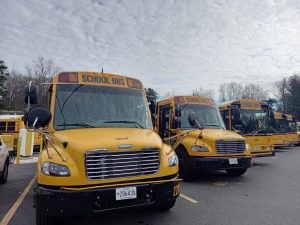
Viles pointed out that there have been psychological as well as economic barriers for school districts to introduce electric buses.
“Now at this point, especially when there’s federal money flowing to give you either a big tax break or this Clean School Bus rebate program, it’s irresponsible not to move forward,” Viles said.



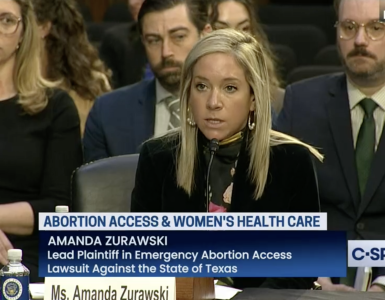












Add comment